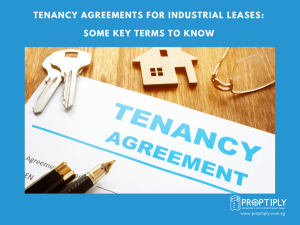
If you have purchased an industrial property for investment and to let out, you will need to draw up a tenancy agreement. This is the a contract between the landlord and tenant and sets out the terms for the rental or lease of your unit. Here are some of the terms you may find in a lease agreement or tenancy agreement.
Lease duration
The lease duration is the length of time the tenant agrees to lease the unit for. For industrial properties, it is quite common for lease durations to last 5 to 6 years, especially if the space if fairly large. Minimising a change in business address would mean less disruptions for the business.
Permitted use
This sets out the agreed business activities that the tenant will be using the premises for. This prevents the tenant from using the premises for activities that are totally different from what was agreed at the outset.
Rental
The gross rent is the agreed amount of rent the tenant must pay every month. It is made up of the base rental rate which is calculated per square foot or per square meter of the floor area, as well as the GST if the landlord is a GST-registered company. Service charges which are typically for maintenance, security and other general services are also included in the gross rental calculations.
Security deposit
The tenant must pay a security deposit, which is usually between 3 to 6 months of gross rent, at the onset if the lease agreement. This deposit is refundable upon expiry of the lease. Should the tenant damage the premises during the lease period, the landlord can use part of the security deposit to deduct the expenses required to repair the damage.
Sub-letting
In most tenancy agreements, there will be a clause which prohibits the subletting of the industrial space to third parties. This means the tenant will not be allowed to let out part or the whole unit to other parties. This protects the landlord and that ensures that the tenants signing the lease are the ones who will actually be occupying the premises.
Reinstatement
This is a requirement that the tenant must reinstate the premises back to its original condition once the lease has expired and if there is no renewal of the lease. Usually, the agreement will state the type of reinstatement the tenant needs to do. For example, some landlords may want the unit to be completely bare upon return of the unit. This could require stripping the unit of all renovations and furniture and doing any repainting or repairing work. However, an exception to the reinstatement clause is if the incoming tenant wishes to take over the premises as is, by retaining all the existing furniture or fittings.
These are just some of the more common terms that can be found in a tenancy or lease agreement. There are a whole host of other terms and conditions and it is best to engage a reputable lawyer to help you to draw up an agreement that will protect both the rights of the landlord and tenant.